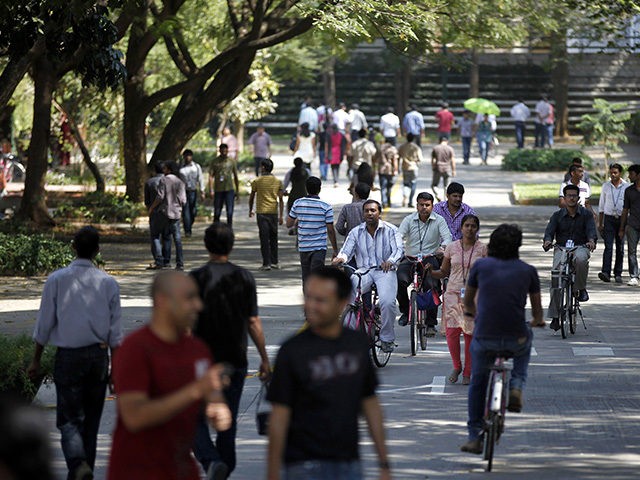Pro-migration lobbies and media outlets are loudly protesting President Donald Trump’s emerging plan to gradually transfer Fortune 500 jobs from H-1B visa workers back to Americans amid the coronavirus crash.
The plan “is economic madness,” says a tweet by Aaron Reichlin-Melnick, an advocate for the immigration lawyers who import the H-1B white-collar visa workers for 53,000 companies. The supply of crabcakes from the Chesapeake Bay will “collapse” if the inflow of H-2B blue-collar workers is interrupted, and the tech industry will be “hurt” if tech companies are forced to hire Americans instead of foreign graduates with Optional Practical Training (OPT) work permits, he tweeted.
But the U.S. tech industry existed before former Presidents George W. Bush and Barack Obama created the OPT program.
The plan “would deepen the economic trouble that we’re in, since most of these [H-1B] visas go to high-skilled people who can’t be replaced overnight,” said another tweet for Reichlin-Melnick, a policy advocate at the American Immigration Council.
But roughly 25 million Americans are available to take new jobs. The huge population includes many Americans skilled in the marketing, management, software, engineering, recruiting, or design jobs held by the roughly 900,000 resident H-1B visa workers.
The establishment’s increased concern is fueled by Trump’s renewed focus on the work visa programs. “The president’s immigration advisers are drawing up plans for a coming executive order, expected this month, that would ban the issuance of some new temporary, work-based visas,” said the May 8 report in the Wall Street Journal. The paper continued:
The order is expected to focus on visa categories including H-1B, designed for highly skilled workers, and H-2B, for seasonal migrant workers, as well as student visas and the work authorization that accompanies them.
Though the scope of the order hasn’t yet been decided, administration officials said it could range from suspensions of entire visa categories to the creation of incentives to hire Americans in industries hardest-hit by layoffs.
Trump’s plan may harm diversity, according to a report by the New York Times’ correspondent in India:
Immigrant groups warn that driven by what they call the Trump administration’s protectionist impulses, the United States could purge some of its most talented workers, cutting into the vibrant multiculturalism that has made the United States such an attractive destination for decades.
…
“In the U.S., you have the whole world working together toward a common goal,” [software developer Priyanka] Nagar said. “You cannot find that diversity anywhere else. I love this country.”
But U.S. tech graduates and their ideal of professionalism managed to get to the moon, invent the computer and the Internet, all well before progressives invented diversity.
The plan will undermine the competitiveness of U.S. companies, says Stuart Anderson, a pro-migration advocate at Forbes:
People who follow technology trends like Everest Group CEO Peter Bendor-Samuel say by providing technical talent many high-skilled foreign nationals and companies that offer services increase the competitiveness of American companies. “Digital transformations and digital platforms are just starting to take off and, as we look into the near future, the current skill shortages are going to grow as the demand for digital and IT skills explodes,” said Bendor-Samuel. “If this administration wanted to harm U.S. competitiveness, then restricting access to this vital labor would be an excellent approach.”
But in a democracy, politicians need to balance companies’ often-arguable claims with their duty to enforce the law, and their need to please the voters who want to have good jobs for families, homes, and retirements.
The claimed popularity of Trump’s plan is a “bluff,” says Todd Schulte, the director of FWD.us, which is an advocacy group formed by wealthy West Coast investors to preserve their supply of migrants workers and consumers:
"US Senators"…currently *10* of 535 Senators & House Reps have signed letters the anti-immigrant groups are pushing calling for this.
98% have NOT yet signed up for this.
The bluff that this is popular comes from the political geniuses behind DACA repeal & family separation! https://t.co/6FfkHlCnG9
— Todd Schulte (@TheToddSchulte) May 8, 2020
But multiple independent polls show the public — including recent immigrants — is overwhelmingly aligned with Trump in prioritizing jobs for Americans over welcomes for legal immigrants.
The plan may be unpopular with the public, according to a subheadline at the Wall Street Journal: “White House advisers are assuming [the] public will be willing to accept new restrictions.”
But underneath the subheadline, the WSJ’s own reporter noted:
The president’s allies have been buoyed by recent polling. While a majority of Americans support immigration, one recent Washington Post-University of Maryland poll shows that—at least as a temporary measure during the coronavirus outbreak—65% of the public backs blocking nearly all immigration into the U.S.
Despite the pressure from migration advocates, the president’s deputies are pushing the plan. “If we are taking actions on immigration that help improve public health, help improve the economy, help improve jobs, it’s a vindication or validation that the president was right since day one,” a senior Department of Homeland Security official, told the Wall Street Journal.
Trump zig-zags towards useful curbs on visa workers, slowly, amid angry pushback from Fortune 500 & Wall St.
Latest leak says new curbs on H-1B wages, outsourcing & job titles. Maybe H-2Bs & OPT, the 'mini-H1B.'
OK, what about B-1s, J-1/SWT, L-1s?#H1Bhttps://t.co/pZj4LMztm4— Neil Munro (@NeilMunroDC) May 8, 2020
Follow Neil Munro on Twitter @NeilMunroDC, or email the author at NMunro@Breitbart.com.

COMMENTS
Please let us know if you're having issues with commenting.